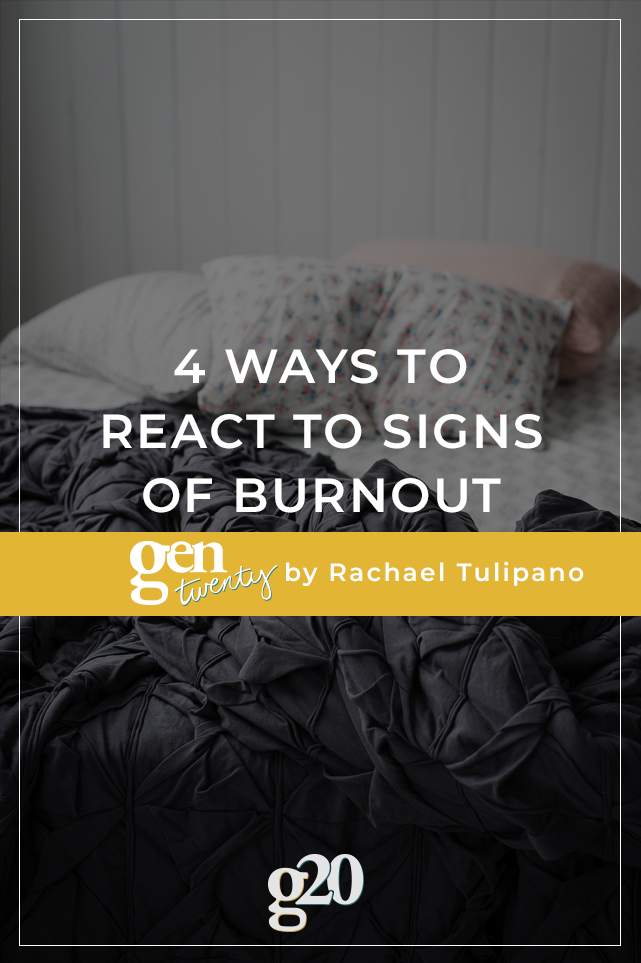
Have you ever been on the brink of burnout? You might know the feeling: physical and/or mental exhaustion from being overworked. Some symptoms of burnout include extreme fatigue, anxiety, loss of appetite, depression, impaired concentration, and more. If you’re an overachiever with the tendency to work long hours, take on heavy workloads, and live life with an enormous weight of pressure on your shoulders, then you probably need to watch for burnout.
4 Ways To React To Signs of Burnout
If you do sense feelings of burnout growing, don’t fret. There are many ways to manage your symptoms. Here are four foolproof ways to react to signs of burnout that can help alleviate your symptoms and protect yourself.
1. Take a break.
If you can, cash in any earned vacation days you have at work and schedule time out of the office. If your work environment has you pulling long hours with unmanageable assignments, this may be a sign that you need a brief hiatus to recoup. You don’t need to be a hero. Employees are allotted paid time off for a reason.
Life cannot be work, work, work and no play. Celebrate your hard work and dedication to your craft by taking some time away from it. That way, you’ll return to work feeling refreshed, fueled up, and ready to tackle a new week.
2. Take care of your health.
Make sure you’re getting plenty of sleep, exercising regularly, and fueling your body with the right foods to keep yourself healthy. Without your health, you cannot very well perform at your best.
When feelings of burnout are on the horizon, it’s your body telling you something is not working. Take a step back from the stress you’re feeling. Ask yourself what you need more of in your day-to-day life. Is it more sleep? An outlet to release the stress, such as running, yoga, or pilates? Is it a well-rounded diet with plenty of water and veggies? Give yourself more of what your body needs to perform well.
[click_to_tweet tweet=”4 Ways To React To Signs of Burnout” quote=”4 Ways To React To Signs of Burnout”]
3. Organize your goals.
Setting goals in an organized fashion is bound to be a big stress relief in your life. If you have endless assignments and projects on your plate, consider investing in a planner or calendar. Set due dates to help you stay on track with your goals.
Mark your calendar when you’ve reached steps toward achieving your goals. Organizing your to-do lists into small, bite-size goals will help you get that much closer to completing your larger goals. With a realistic, organized plan in place you will no doubt have an easier time managing your workload, thus keeping symptoms of burnout at bay.
4. Don’t take on more than necessary.
When it comes to working, you don’t need to take on more than you can realistically accomplish. Don’t put more on your plate than you can handle. Overcommitting to projects is only going to increase the likelihood of developing burnout.
If you work for an employer, it is understandable that you may not have much say in what projects are assigned to you, but speak up if the expectations put upon you are unrealistic. If you are your own boss, make sure you’re not doing it all. Find help when necessary and speak up when you’re feeling overwhelmed. Reacting to burnout by saying no when you’re already maxed out is going to help relieve some stress.
Burnout is no joke. If you’re feeling burdened with stress, it can wreak havoc on your body in physical, mental, and emotional ways. Speak up if you’re in dire need of help.
Everyone needs a break from time to time. Be sure you’re eating well, getting enough sleep, and have an outlet to destress. Make time for your friends, family, and rest and relaxation. We’re all aiming for success, but no one can be successful if they’re facing burnout. Take care of yourself, fellow twenty-something!
